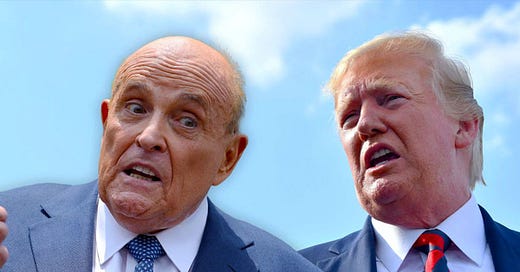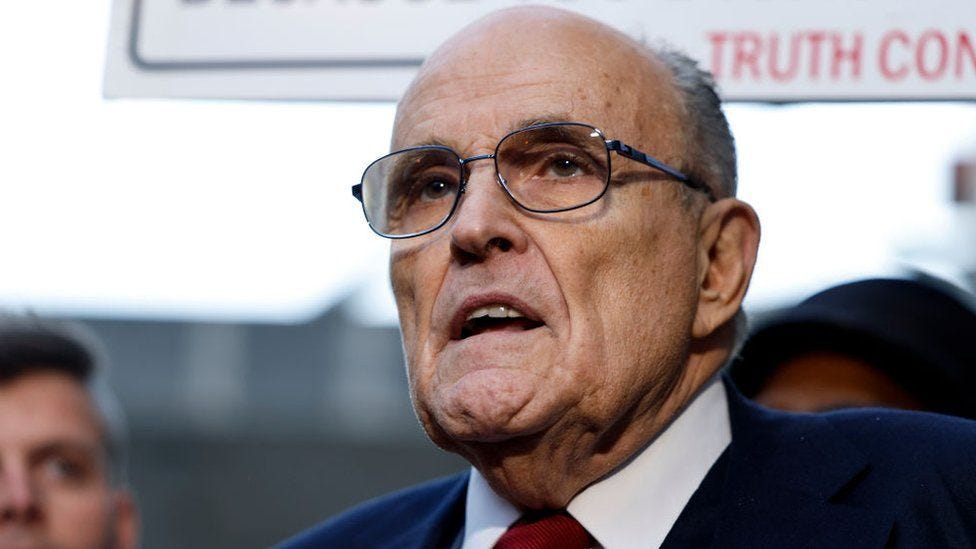Rudy Giuliani: From a Popular Public Figure Towards Pauperization
Rudy Giuliani files for bankruptcy after $148m defamation verdict .
The Precipice of Financial Ruin: Filing for Bankruptcy
Rudy Giuliani has filed for Chapter 11 bankruptcy in New York, one day after a federal judge ruled that he must immediately pay the $148 million he owes two Georgia women he falsely accused of helping to steal the 2020 election. In paperwork filed Thursday to seek protection from creditors, Giuliani listed up to $500 million in debts, including the $148 million he owes former Georgia election workers Ruby Freeman and Wandrea ArShaye “Shaye” Moss. He also listed “unknown” amounts of debt to election technology companies Smartmatic and Dominion Voting Systems, which named the former New York mayor in their defamation lawsuits about the 2020 presidential election. He listed his assets between $1 million and $10 million.
“The filing should be a surprise to no one,” Ted Goodman, a political adviser to Giuliani, said in a statement. “No person could have reasonably believed that Mayor Rudy Giuliani would be able to pay such a high punitive amount.” Goodman said the Chapter 11 filing would afford Giuliani “the opportunity and time to pursue an appeal, while providing transparency for his finances under the supervision of the bankruptcy court, to ensure all creditors are treated equally and fairly throughout the process.”
Legal and Financial Quagmire: The Fallout of Defamation Case
The bankruptcy filing in New York comes the day after the judge overseeing Giuliani’s defamation case in Washington ordered him to immediately pay the $148 million he owes Freeman and Moss. Judge Beryl A. Howell wrote that there was a strong danger Giuliani is likely to hide his assets from the women, who had asked a jury at trial to award them roughly $47 million in damages for the racist attacks and abuse they received after Giuliani spread the debunked information about them. Attorneys for Freeman and Moss still have to enforce the judgment against Giuliani, which may involve further court proceedings. But they do not have to wait the standard 30 days to begin trying to seize his assets.
“This maneuver is unsurprising, and it will not succeed in discharging Mr. Giuliani’s debt to Ruby Freeman and Shaye Moss,” Freeman and Moss’s attorney Michael Gottlieb said in a statement to The Washington Post after Giuliani’s filing for bankruptcy. Giuliani talked about filing for bankruptcy on his radio show Thursday afternoon. “I believe it was the responsible and only thing to do,” Giuliani said. “I do not have the money to pay a $148 million verdict.” He also said, “Without that, I am not bankrupt.”
Bankruptcy Implications and Future Maneuvers
Legal analysts say going bankrupt wouldn’t get Giuliani out of paying the women. On the night the jury returned its verdict against Giuliani, the former U.S. attorney for the Eastern District of Michigan, Barbara McQuade, said on MSNBC that debts for defamation and intentional infliction of emotional distress cannot be eliminated through bankruptcy. However, he could attempt to re-litigate whether his conduct was, in the words of bankruptcy law, “willful and malicious.” Such a fight would take place before a bankruptcy judge and could allow Giuliani to delay payment or negotiate a post-verdict settlement, experts said before Howell issued the order demanding that Giuliani pay the women immediately.
Chris Mattei, who represented parents of Sandy Hook victims who won a $1.5 billion judgment against Alex Jones, said there are benefits and drawbacks for the plaintiffs in Giuliani’s bankruptcy. The downside is that any collection is put on hold until the bankruptcy proceedings are over. But the upside is that it is much harder for Giuliani to hide or spend down his wealth. “The whole idea for Giuliani here is to try to show what his assets are so he can then try to leverage a settlement in the bankruptcy court” that is far lower than the judgment, Mattei said. But because the debt cannot be eliminated through bankruptcy, “they are likely going to have a lot of leverage to say, we don’t want to take the pennies on the dollar.” On Monday, Freeman and Moss filed another suit against Giuliani for continuing to make comments about them that his lawyer previously conceded in court were untrue.
From National Hero to Controversial Figure
Rudy Giuliani, born in 1944 in Brooklyn, New York, is a complex figure in American political history, known for his leadership, legal career, and controversial associations. A graduate of Manhattan College and New York University Law School, Giuliani initially built his reputation as a tough and effective U.S. Attorney in the Southern District of New York, targeting organized crime and corruption. As Mayor of New York City from 1994 to 2001, Giuliani was credited with significant improvements in the city's safety and economic vitality. He implemented policies that contributed to a reduction in crime and was a proponent of the controversial "stop and frisk" policy.
His tenure was not without criticism, with some accusing his administration of heavy-handed tactics and overlooking social and racial divisions. Giuliani's leadership during the 9/11 attacks brought him international attention and acclaim. His calm, resolute handling of the crisis earned him the nickname "America's Mayor," and for a time, he was considered a national hero. His visibility during this period significantly boosted his profile, leading to numerous speaking engagements and business opportunities.
A Stark Transformation: The Legal Tangles and Public Backlash
Post-mayoralty, Giuliani initially sought a career in national politics, including an unsuccessful bid for the Republican presidential nomination in 2008. However, it's his role as a lawyer and advisor to Donald Trump that has defined his recent years. He became one of Trump's most vocal and loyal supporters, serving as his personal attorney. Giuliani played a key role in Trump's defense during the Mueller investigation and subsequent impeachment trials. His efforts to uncover damaging information on Trump's political rivals, particularly in Ukraine, and his propagation of election fraud claims after the 2020 election, have been widely criticized and led to legal and reputational challenges.
In recent years, Giuliani has faced significant personal and financial difficulties. His legal battles, including lawsuits and investigations into his business dealings and conduct as Trump's lawyer, have mounted. In 2022, he was suspended from practicing law in New York and Washington D.C. due to his false statements about the 2020 presidential election. The culmination of these legal troubles and possibly dwindling income from consulting and legal work have reportedly led to his filing for bankruptcy. Giuliani's journey from a respected prosecutor and celebrated mayor to a controversial political figure reflects a stark transformation, influenced by his alliances and the polarized nature of American politics. His story is a testament to the complexities of public life and the enduring impact of personal choices on public legacy.






